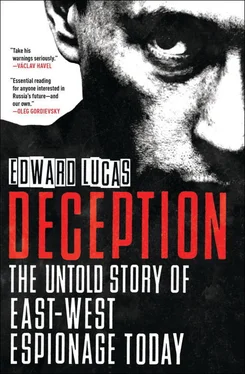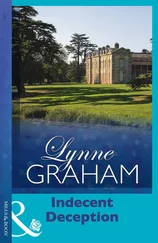British intelligence is known all over the world as one of the best. Of course I trusted them. I felt elevated to be a member of the British intelligence service and I tried to do my best.
He found the news that he had been a pawn in the KGB’s game shattering:
It was like a blow on the head. I could not understand how an intelligence service like the British could have made such a mistake. It was unbelievable… I took the risk but I hoped for normal work. But what happened? I was from the beginning like a blind kitten put into the net of Soviet intelligence. What was the risk for, all the suffering, and all the broken life? 43
A galling footnote came when Kudirka turned up in London in 1990 in the vain hope of retrieving his belongings, including irreplaceable family photographs, which he had left with SIS for safekeeping. His former case officer, John Ludzius, met him in a pub with the bracing greeting: ‘I thought you were all dead.’ 44In the 1990s another Lithuanian SIS man, Anicetas Dukavičius, also tried (apparently unsuccessfully) to gain some compensation from the British authorities. After some lobbying and the publication of Mart Männik’s posthumous memoirs, the Männik family on 4 June 2003 received €10,000 from the British government.
Such stingy, tardy or outright hostile treatment contrasts sharply with the efforts made by SIS (and the CIA) to find dependants of dead agents from the more recent era. In one creditable and poignant episode in 1990, a young woman received a startling and mysterious invitation, summoning her to a meeting in the presidential offices in Prague Castle where senior SIS officers and their local counterparts explained what until then had been an inexplicable misfortune in her life. Her father Miloslav Kroča, the head of the British section of the communist secret police, the StB, had died (naturally) of a heart attack in 1976; her mother had some time later became ill after mistakenly taking one of his invisible-ink pills, kept in an aspirin bottle. Puzzled, she took the pills to a pharmacist; an investigation eventually alerted the authorities that the dead man must in fact have been a Western spy. Forced to live in miserable conditions in a remote part of the country, the family was blighted. The mother died, while the daughter was barred from higher education or a proper career. The visitors then handed over a large sum of money, explaining that though her father had spied for the West solely on ideological grounds he had asked that if anything were to befall him his family should be taken care of. 45Mr Kroča, one of the most important British spies behind the Iron Curtain, was recruited by Richard Dearlove, then a ‘First Secretary’ (but actually SIS officer) at the British embassy in Prague and later Chief of MI6.
Perhaps the most tantalising loose end comes from Alexander Koppel, who is almost certainly the last surviving agent from Operation Jungle. Tracking him down was rather like finding a pterodactyl alive and well in a bungalow near London (in Mr Koppel’s case, Wokingham). A glass-fronted bookcase containing medals and memorabilia is the only sign of his extraordinary past. A sprightly 85 (when I interviewed him in early 2011), he described in matter-of-fact terms his recruitment, training, life in the ‘underground’, capture, interrogation and eventual release. He came to Britain in 1947, and worked in Dunstable in a cement works, along with many other Estonian, Latvian and Lithuanian young men keen to leave the displaced person camps of post-war Germany. It was a hard, dull life. News from home was scant: even discovering which family members were alive and which had perished was hard.
In 1952 Mr Koppel was approached by Rebane and asked if he would be willing to go on a mission as a radio operator. He initially declined: his parents were still in Estonia, and would suffer horribly if he were caught. He recalls that Rebane tried to reassure him, in words that seem bizarrely complacent in retrospect: ‘Don’t worry – it’s quite safe, quite nice.’ Getting there, he said, was ‘as simple as a bus ride’. Mr Koppel moved to Old Church St, and started training. His task was simply to operate a radio, so he received what he describes as ‘negligible’ instruction in spycraft or combat. [63] bk He had been conscripted in the German army briefly in 1944, but did not serve in Rebane’s unit.
The trainees were taken sightseeing to Stonehenge, and for a boat trip on the Thames. A Lithuanian taught them Russian, which they barely spoke. The evening before his departure, Rebane took him aside to give him a final briefing. ‘Take no initiative. You are only the radio operator. Take orders from “Karl” (the partisan commander). Don’t drink. Know your place.’
The first hint of trouble came when Mr Koppel arrived in Saaremaa, an island off Estonia’s coast that had once been a hotbed of anti-communist resistance. He was met by partisans who – had he known it – were all seasoned KGB officers. They took his carefully packed suitcase, which contained money, arms and other material for the resistance, and returned it with the contents jumbled, claiming that it had been dropped and burst open. His enquiries about the situation in the country got cursory answers. Hidden in an attic in a farm near Viljandi in southern Estonia, Mr Koppel got on with encoding and sending messages to London.
His KGB colleagues made life seem realistic, at one point staging a hurried forced march into the forests to avoid a house search. Mysterious lorries came and went in the night – in fact collecting and delivering teams of KGB watchers, but straining his nerves. In the winter of 1954–5, the partisans said it was time to move to a new location in northern Estonia. The group broke its journey at a villa in Nõmme, a plush suburb of Tallinn. Food and drink were offered to celebrate – according to ‘Karl’, the supposed leader of the group – a Soviet ID document that the partisans had obtained for their guest.
I started to feel funny. I said, ‘I’m not used to drinking.’ But after that I had no time to think. I collapsed. I heard noises and sensed movement. When I recovered I was naked in a small room. There were Russians, faces looking in. And two Estonians, smirking.
The KGB was convinced that Mr Koppel would have a cyanide pill and had stripped him naked while looking for it. But this standard procedure had been overlooked during his trip – perhaps, he says, because he had been so seasick. His main worry was his parents. Unwisely, he had confided to his partisan ‘colleagues’ in the bunker that his relatives were alive and in Estonia. He played for time, but soon realised that every detail of his mission was already known. ‘Every cloud has a silver lining,’ he recalls thinking. ‘I can’t give away anything because they know it all already.’ It was Mr Koppel’s good fortune, perhaps, that his capture came after Stalin’s death, and when the focus of KGB efforts was far more on counter-espionage than counter-insurgency. His captors decided to try and use him for their own purposes. With the threat of sanctions against his relatives always in the background, they moved him to a new location and told him to keep sending regular messages to the British, just as before. This continued for more than a year. Then followed the great puzzle of the story.
In 1956 Mr Koppel was suddenly taken to Moscow, where he was held in the Lubyanka – the infamous headquarters of the KGB. No explanation was given, and the treatment was good – at one point his hosts even took him to the Bolshoi Ballet. ‘I am not pointing fingers,’ he says. ‘They were nice and polite’ (this may well be the only time that an imprisoned SIS agent has applied this particular set of adjectives to his KGB captors). References to Mr Koppel in KGB files make it clear that his captors believed they had secured his agreement to work in the West. In the small hours of a summer morning, they took him to the coast of northern Estonia, and to his huge surprise gave back his gun, and provided him with a boat, a compass bearing to a lighthouse, and a phone number in Finland.
Читать дальше












